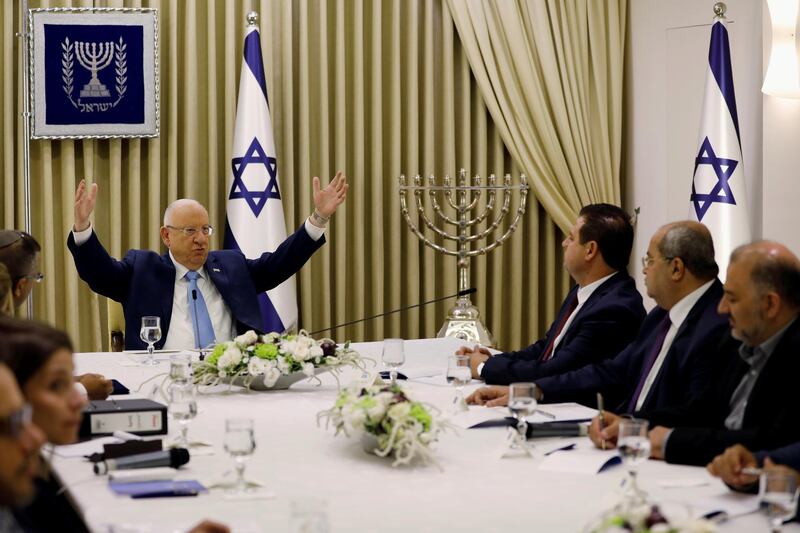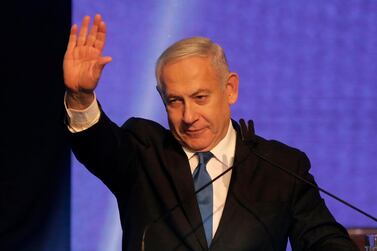Israeli President Reuven Rivlin called Prime Minister Benjamin Netanyahu and his main rival Benny Gantz for a meeting on forming a unity government on Monday.
He announced in a statement he had invited the two to a meeting together as he considers whom to task with trying to form a government following last week's deadlocked elections.
The meeting came after the president finished two days of consultations with Israel’s different political factions to receive their recommendations for which individual should be charged with trying to form a majority coalition after last week’s election that produced no obvious winner.
The president's post-election talks are usually a formality, but the largely ceremonial president is now playing a key role after an almost tied election result. He is expected to announce his choice Wednesday.
"There is one thing that the people are largely united over and that is the desire that there won't be third elections," Rivlin said.
Mr Gantz's centrist Blue and White alliance finished with 33 seats in the September 17 elections, while Mr Netanyahu's right-wing Likud won 31.
Despite Mr Gantz's slim lead, neither has a clear path to a majority coalition, putting Mr Netanyahu's long tenure in office at risk.
Both Mr Netanyahu and Mr Gantz have also called for a unity government. Mr Gantz however says he should lead it since his party is the largest.
The standoff has even raised the possibility of yet another election – which would be the third in a year's time after April polls also ended inconclusively.
Mr Rivlin has said he will do all he can to avoid another election, and Monday's meeting saw him seek to play a mediator role.
In Mr Rivlin's first round of talks on Sunday, the Joint List, Israel’s Arab-majority bloc, threw its support behind Mr Gantz, the first time it had recommended a candidate since 1992, saying it was doing so in a bid to topple Mr Netanyahu, whose anti-Arab rhetoric has infuriated and offended Arabs in Israel during his decade in power. The backing promised to give Mr Gantz a slight edge in support.
But on Monday, the Joint Arab List said it was withdrawing some of its members' recommendations for Mr Gantz, trimming his support to below Mr Netanyahu's.
Joint List leader Ayman Odeh said he is planning on becoming opposition leader in the case of a unity government. As the leader of the largest party in opposition, he would be entitled to the position, which includes meetings with visiting world leaders and access to sensitive security information.
So far, a total of 55 politicians have recommended Mr Netanyahu for prime minister, while 54 have endorsed Mr Gantz. The prime minister needs at least 61 seats to have a parliamentary majority.
Neither party can form a coalition without the eight seats won by firebrand former Defence Minister Avigdor Lieberman, who on Sunday declined to endorse either candidate for prime minister. Mr Lieberman has pushed Mr Gantz and Mr Netanyahu to agree to sit with him in a broad, secular unity government.
There were only narrow differences in the two main parties' campaigns on many important issues during the campaign. An end to the Netanyahu era would be unlikely to bring significant changes in policy on relations with the United States, the regional struggle against Iran, or the Palestinian conflict.
The vote last week was a never-before held second election which was triggered after Mr Netanyahu was unable to forge a coalition and then dissolved parliament.
Mr Netanyahu had hoped to secure a narrow majority of hard-line and religious parties that would grant him immunity from prosecution on charges that could include bribery, breach of trust and fraud. But now that possibility appears to be off the table.
Israeli law does not require a sitting premier to resign if indicted. But if he is charged, as is widely expected, he will come under heavy pressure to step down.
Mr Netanyahu faces a hearing next month on the charges and indictments could follow soon thereafter.






